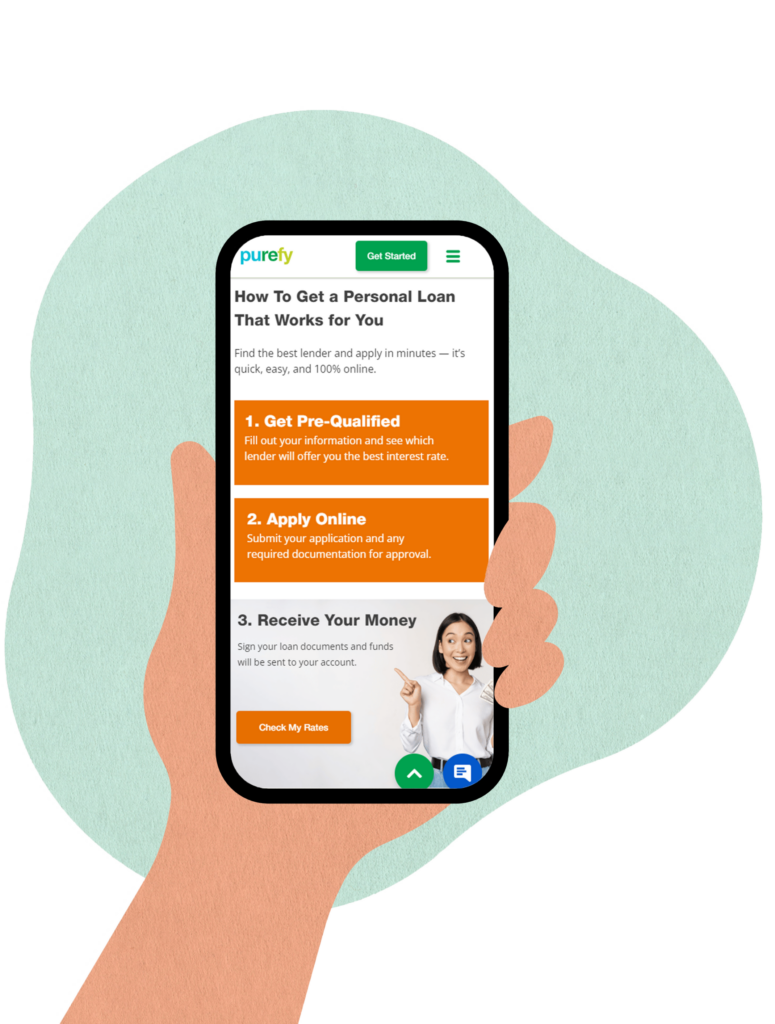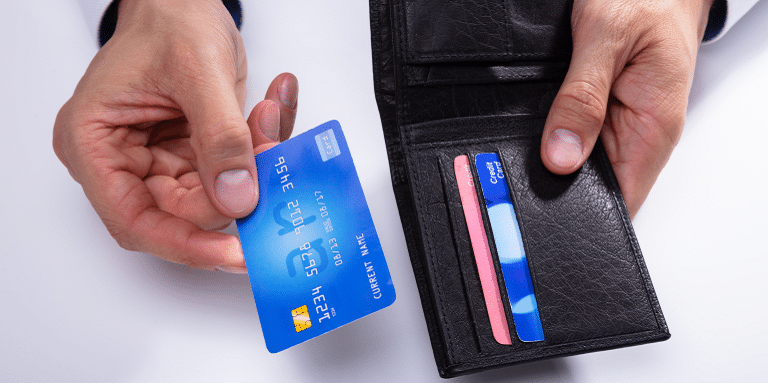Credit card debt consolidation is touted as a great way to pay off debt faster and save money, but is it always a good idea? Although it can be an effective method to manage your debt, credit card consolidation does require a significant amount of discipline — and good credit — to work.
Before applying for a credit card consolidation loan, consider the pros and cons and potential alternatives to find the best options for you.
How Credit Card Debt Consolidation Works
Credit card debt is common. According to Experian, one of the leading credit bureaus, the average credit card balance is $5,221. The problem with credit card debt is the high annual percentage rates (APRs) that cards have. Considering that the average interest rate on credit cards that assess interest was 20.4%, interest can accrue rapidly, causing your credit card balance to balloon out of control.
Because of the high APRs and growing balances, paying the minimum required each month means you’ll be in debt for years. You’ll also pay thousands more than you originally spent due to interest charges.
That’s why many people turn to debt consolidation loans. These loans are a type of personal loan you can use to pay off your credit card debt. You apply for a personal loan that covers the amount of your outstanding credit card balances. By paying off the cards, you shift your debt to one installment loan with fixed monthly payments.
If you have good credit, you could potentially qualify for a credit card consolidation loan with a relatively low interest rate. According to the Federal Reserve, the average rate for personal loans with two-year terms is 11.23%.
Pros of Credit Card Consolidation
There are several advantages to consolidating your debt with a personal loan:
You Could Save Money
One of the biggest reasons for consolidating debt is to save money. Personal loans tend to have much lower interest rates than credit cards, so you can save money on interest charges by consolidating your debt.
For example, let’s say you have a credit card balance of $5,000 at 20% APR. If you make the minimum payment of $100 per month, it will take you five years to pay off your balance. Worse, you’ll pay a total of $7,948.17; interest charges will add nearly $3,000 to your repayment cost.
If you consolidate your debt, you could take out a personal loan with a five-year term and 10% APR. By consolidating your debt with a personal loan, you’ll pay off your loans within the same time frame, but you’ll pay just $1,374.11 in interest charges. Consolidating your debt would allow you to save about $1,500.
You Could Get Out of Debt Faster
If you qualify for a credit card consolidation loan with a lower APR than you have on your credit cards, you can pay off your debt faster. Less interest will accrue, so your payments will chip away at the balance more quickly, allowing you to become debt-free sooner.
You’ll Have One Easy Payment
If you have multiple credit cards, juggling balances and due dates can be challenging. When you consolidate debt, you combine your balances into one loan, so you’ll have just one account and one monthly payment to make.
Debt consolidation can boost your credit score
When you consolidate your debt with a personal loan, your credit card balances are eliminated. That means your credit utilization — the amount of available credit you have — improves. Your credit utilization accounts for 30% of your credit score, so consolidating your debt can actually improve your credit.
Outsmart Rising Credit Card Interest Rates With a Personal Loan
Credit card APRs often exceed 20%. Get your finances on the right track today with a quick & easy personal loan from our marketplace of top-rated lenders
Cons of Credit Card Consolidation
Although debt consolidation can be helpful, there are some downsides to keep in mind:
Not everyone qualifies for low-interest loans
To qualify for a personal loan with a lower rate than you have on your credit cards, you’ll typically need good to excellent credit. If you’ve had trouble managing your debt, have maxed out your spending limits or have missed payments in the past, you may not qualify for a personal loan or you may only get one with a very high rate.
If your credit is in the poor to fair range, focus on boosting your credit before applying for loans. Make all of your recurring payments on time, pay extra toward your debt to bring down your balances, and avoid unnecessary credit inquiries to increase your credit score.
There may be added fees
Some personal loan lenders charge additional fees. Lenders that cater to borrowers with less-than-perfect credit often charge origination fees to cover the cost of underwriting, processing, and disbursing loans.
Origination fees can be anywhere from 0% to 10% of the loan amount, and lenders deduct the fee from the loan amount before disbursement. For example, if you took out a $5,000 loan with a 10% origination fee, the lender would deduct $500 from the loan, and you’d receive just $4,500.
Not all lenders charge origination fees, so shop around to find the best deal. And if you have poor credit or cannot qualify for a loan on your own, adding a cosigner to your personal loan application can improve your chances of getting a loan without added fees.
It doesn’t fix the root problem
Credit card consolidation is useful if your debt is because of extraordinary circumstances, such as a sudden medical emergency. But if your credit card debt is because of more long-lasting issues, such as inadequate income or impulse shopping, credit card consolidation doesn’t address the root cause of the problem. In fact, it can worsen it, because now your credit card limits are freed up.
If you haven’t addressed what caused you to get into debt in the first place, a debt consolidation loan can exacerbate the problem and add to your debt. Only consolidate your credit cards once you have your spending in check and a budget in place.
Debt Consolidation Calculator
Personal loans can be used to consolidate your debt into a single loan with a new rate and term. See how much you can save by entering your loan information below.
Step 3: See How Much You Can Save
| Current Debt | Personal Loan | Savings | |
|---|---|---|---|
| Monthly Payment | $600 | $483 | $117 |
| Lifetime Interest | $5,400 | $2,399 | $3,001 |
| Time to Payoff Debt | 2 yrs 10 mos | 3 yrs | 2 mos |
Want to compare personalized prequalified rate offers from top personal loan companies? We’ve partnered with Credible to help get your finances back on track with free rate comparisons — with no impact on your credit score.
Credit Card Consolidation Loan Alternatives
Although debt consolidation loans are useful tools, they’re not for everyone. Depending on your circumstances, one of these alternative methods for managing debt may be a better choice:
- Balance transfers: A balance transfer is when you transfer the balance from one credit card to another with a lower APR. Some cards offer 0% APR for a limited time, giving you time to pay off your debt without interest charges.
- Debt negotiation: If you have good credit and haven’t missed payments, you have some negotiating power. Reach out to your credit card issuer and ask for a rate reduction. Credit card companies compete for good customers, so they may give you an interest rate reduction to keep you as a customer.
- Debt snowball/avalanche methods: The debt snowball and debt avalanche are two methods for paying down debt. They each involve paying the minimum toward all of your accounts and focusing your attention on paying extra toward just one credit card account at a time. The debt snowball focuses on the account with the lowest balance first, while the debt avalanche method focuses on the account with the highest interest rate.
- Debt counseling: If you’re overwhelmed by your debt and aren’t sure how to move forward, consider meeting with a debt counselor at a non-profit credit counseling agency. The counselor can help you create a budget, develop a debt repayment plan and even work with your creditors to reduce any fees you may owe. The U.S. Department of Justice has a list of approved credit counseling agencies that may be able to help you.
The Bottom Line
Credit card debt consolidation can be an effective way to save money and pay off debt faster, but it’s not a magic cure for debt. You still need to do the work to control your spending and make payments to make debt consolidation useful; otherwise, you risk ending up even more in debt.
If you’ve weighed the pros and cons and feel that debt consolidation is right for you, you can get quotes from leading personal loan lenders and compare options without affecting your credit score.
You can use Purefy to quickly and easily shop for a debt consolidation loan.
Credit Card Debt Piling Up?














